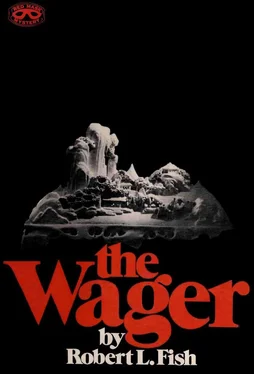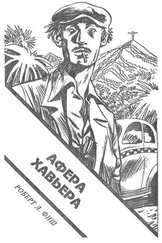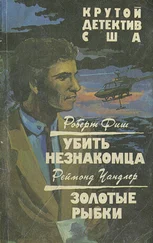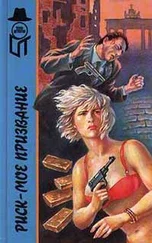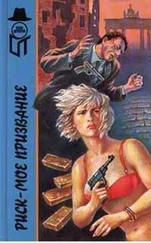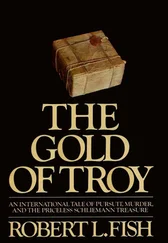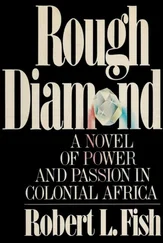“What good would that do?” Rafferty asked, his tendency for logic once more functioning. “I never saw it there in the first place.”
For a moment Jamison’s face fell. He mentally kicked himself for not having used Rafferty to better advantage as a witness when the two of them were last in the cabin. It was true that in that case Rafferty would be of small use in court, but the evidence of the carving was actually all that a judge would need to put Huuygens behind bars where he belonged.
“It was there and now it’s gone. Take my word for it,” he said shortly, and then his face creased in a smile and he rubbed his hands. “Now to see how Mr. Huuygens tries to get it through Customs!”
Mr. Huuygens, edging his way down the gangplank and then walking in the direction of the huge H hanging from a dingy rafter, was not greatly surprised to see a uniformed Customs official standing beside his three bags, refusing the importuning of earlier arrivals. In fact, he was surprised to see that other officials were also not at work as yet. He looked about for André, but although the large man had preceded Kek down the gangplank, he was nowhere to be seen. In the other direction, Anita, for once unaccompanied by Billy Standish, waited patiently for the Customs ritual to begin.
Kek came up to his bags and nodded pleasantly to the man hovering over them. “Those are my bags beside you,” Kek said, and reached into a pocket, bringing out a declaration form and handing it over. “Would you care to examine them?”
“I believe we’d rather do it inside,” the Customs man answered with a faintly malicious smile, refusing the declaration form by simply ignoring it. Stories about Huuygens were legion in the Customs service. “You don’t mind?”
“Of course I mind,” Kek told him a bit crossly. “Wouldn’t you?” He shrugged helplessly. “Well, if I must, I must, I suppose. Would you want me to help you carry one of those bags for you?”
“I can handle them quite nicely,” said the official, and picked them up. He led the way across the shed to offices there, while the other passengers looked after them curiously, certain a bribe of some kind had assured this passenger special treatment. They should know! Kek thought with an inward smile, and closed the door behind him. The Customs man set the bags down on a bench-cum-deck. Kek turned. His eyebrows raised in surprise.
“Mr. Jamison! You poor man, do they suspect you of something improper, too?”
“It’s time to end the masquerade,” Jamison said, and drew himself up, speaking in his most official manner. “Mr. Huuygens, you might as well know that I am with the Treasury Department — with the Customs Service, to be exact — and that we have strong reason to suspect you are carrying contraband. I’ve had my eye on you from the beginning; it was, in fact, my reason for being on the cruise. I’m afraid I must ask you—”
“No!” Kek said, absolutely astonished. “You mean—”
“I’m afraid it’s true. And I’m also afraid we must ask you to submit to a thorough search of your person and your belongings.”
“I’m amazed!” Kek looked it. “I must compliment you on a masterful performance. Are you sure you never had stage training?” He shrugged and got back to the matter in hand. “But the truth is, I’m afraid you’ve had all your trouble for nothing. Here’s my declaration form.”
“Ah, yes, your declaration form.” Jamison took it and scanned it calmly, smiled, and looked up. “Nothing to declare?”
“That’s right. So you see,” Kek said earnestly, “you’ve been mistaken.”
“I doubt it,” Jamison told him, in command every inch of the way. “What about that — ah, candy dish I saw you with in Barbados?”
Kek looked puzzled. “Candy dish?”
“The package under your arm at the shed in Barbados.” Jamison was the soul of patience. He hoped that Blazak, the other official, would watch and learn. “While you were listening to that steel-drum band. You said you’d found some waiter using it for an ashtray.”
“Oh, that? I’d forgotten about that. I don’t remember what I did with it, as a matter of fact. I probably forgot it and left it on the ship. I certainly don’t recall packing it.”
“Well.” Jamison smiled in friendly fashion. “Let’s see if we can help you find it. We’d never want you to lose a candy dish.”
“Is it that important, really?” Kek asked, exasperated.
“Yes,” Jamison said simply and gestured toward the cases. “Would you unlock them, please?”
“They’re not locked.” Kek’s tone clearly indicated that only those without clear consciences needed to lock cases.
“Good,” Jamison said, unimpressed by the playacting. “Blazak?”
“Yes, sir!” The uniformed Customs man sprang to attention.
With Jamison’s gesture, the search began. Blazak started with the small overnight case, while Jamison alternated his gaze from the case to Huuygens’ face. It was amazing how often people gave away their guilt, or a hiding place, by a quirk of the eyebrows or a tightening of the nostrils. Kek merely yawned, however, and leaned against one corner of the bench as Blazak went through the items there one by one. Shaving paraphernalia joined toothbrush and toothpaste, and in turn was joined by aspirin, mouthwash, spare razorblades, and deodorant. It was plain to Blazak that if an object the size of a pin failed to escape his search, certainly nothing the size of the carving he had been told they were searching for could, or would. When the overnight case had been emptied, the case’s sides, top, bottom, and ends were rapped and checked for thickness. Only when both Jamison and Blazak were certain the case was innocent of any wrongdoing, were the items replaced. Blazak snapped the lock shut and moved to the smaller of the remaining cases.
Here the drill was repeated, with Jamison still watching and still not perturbed by the lack of evidence so far. He was sure that Huuygens had the carving — either Huuygens or his confederate — and the confederate was going through the same type of search in the adjoining room.
The second case was emptied and studied. Then Blazak began replacing the socks, shoes, ties, and other apparel. Kek was pleased to note that Blazak, in addition to being thorough, was also neat, a trait he most probably learned at his mother’s knee, rather than in the Department.
The second case was latched and the third case was opened, when Blazak found himself pushed aside as Jamison, in his eagerness, would not wait. “I’ll take this one myself,” he announced, and began dragging jackets and trousers precipitously from the case.
“Hold it!” Huuygens said, annoyed. “You’ll wrinkle them!”
“Will I, now!” Jamison said, and began pressing each garment between his hands.
“Yes, you will, damn it!” Huuygens said, his voice taut. “Leave them alone! You’ll ruin them!”
“Will I, now!” There was sudden triumph in Jamison’s voice; his horseface was aglow with success. He shoved a hand deep inside the inner pocket of a sport jacket. The lining had been torn and the object he had located was in back, down by the hem. A more casual examination might well have missed it. “You need a tailor,” Jamison told him with an attempt at humor, and withdrew a brightly colored package. It was the same one he had seen under Huuygens’ arm on the pier in Bridgetown, the one first seen and then removed from the duct in the other’s stateroom. “Well, well!” Jamison said, smiling. “I do believe we may have found that candy dish you lost!”
Kek tried to look relieved. “Well. I certainly hope so. So that’s where it went, eh? I’ll have to get that lining fixed.” He put out his hand. “Let me have my declaration back and I’ll mark it down. ‘One candy dish, fifteen dollars, Wedgwood.’”
Читать дальше
